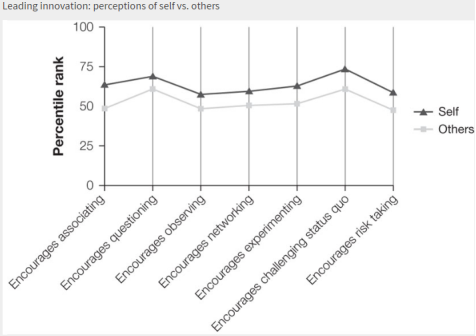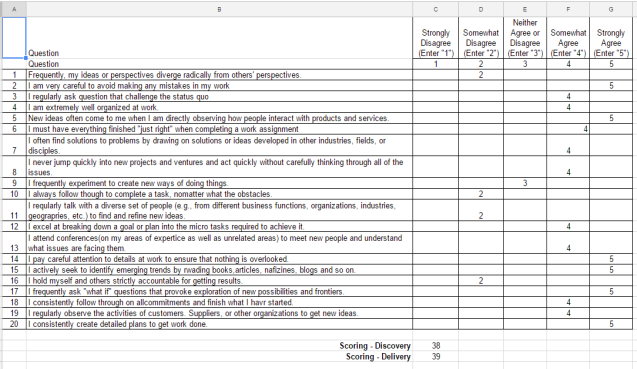Eunice Joy Gajjala
Introduction
Covey, S. R. (2004, p. 171). “With people, little things are big thing”. In some people, Innovation comes by birth. Some develop their innovative skills by learning and practicing. If they get the enough support from their family and friends, they would become the supervisors of the company and make it a huge success with their innovative skills.
Five skills make the innovators unique from others. Ordinary people must acquire these skills to become creative.
- Associating
- Observing
- Questioning
- Networking
- Experimenting
Action Plan
An individual can become an innovative person by developing the following the below guidelines
- Reviewing Priorities
- Assess your Discovery skills
- Identify a compelling innovative challenge
- Practice your discovery skills
- Get a coach
Before undergoing any task, first, we must assign the priorities for the tasks that we must complete on time. There are things which need to be met by giving high priority with respect to time, and there are things that can be delayed. We must plan, analyze, execute and implement them as per the strategies to achieve the goal. After assigning the priorities, we must work on strengths and weakness of our delivery and discovery skills. Later, we must work on the task in which we are facing challenges. This may be a personal challenge or an innovative challenge. Make a plan to practice the discovery skills to become innovative
After choosing the challenges, we must work hard on the problems. Practice all the five discovery skills to overcome the problem. The first step for practicing is questioning. Try to improve the questioning skills Questions storming activities. Later identify the strongest skill that you possess and practice it. A coach or a mentor would always be helpful to motivate us in developing the discovery skills.
Ethical Impact
“Back Biting” is the issue that impacts the organization. Employees will reveal the secrets of one organization to the other one which is known as the internal threat to the company. It usually occurs due to the dissatisfaction in the current organization. This kind of behavior is usually resolved by broadening the emotional intelligence and by making the employees follow the ethical culture of the company.
Ethical Framework
Covey, S. R. (2004, p.348), ” I suggest three ways to develop spiritual intelligence: first, integrity-being true to one’s highest values, convictions and conscience, and having a connection with the Infinite; second, meaning-having a sense of contribution to people and to causes; and third, voice-aligning our work with our unique talents or gifts, and our sense of calling”. To overcome the ethical issue of back biting, spiritual intelligence has to be build up in the employees. Managers have to involve in this process. We can avoid the internal threats to the company by building up the emotional intelligence in the current employees. As said by Covey, we can develop the spiritual intelligence by integrity, meaning and voice aligning.
Developing Discovery skills in Next Generation
Technology is developing day by day, so as the innovation. Consider, Mark Zuckerberg, he used to sit on the last bench in his schooling, he was not soo studious, but even then now he became the CEO of the world’s number one social networking site, i.e., Facebook. He achieved this position with his innovative and discovery skills. It is the responsibility of the adults to improve the discovery skills in the children.

The above diagram represents the leading innovation of a person with others. We must encourage the next generation through the developing as well as the risk-taking skills.
Sawhney, M. (2016, para. 1), “A company can innovate along any of 12 different dimensions with respect to its (1) offerings, (2) platform, (3) solutions, (4) customers, (5) customer experience, (6) value capture, (7) processes, (8) organization, (9) supply chain, (10) presence, (11) networking, and (12) brand”. A company can choose many ways to innovate. Each organization follows its strategies and policies to innovate.
My Dyer-Discovery and Delivery Skills
This table represents my Dyer-Discovery and Delivery Skills, The discovery skills are 38 and the delivery skills are 39. I almost possess equal discovery and delivery skills.

Conclusion
Dyer, J., Gregersen, H., & Christensen, C. M. (2011, p. 221). “Innovative leaders know innovation doesn’t just happen, but requires a significant time commitment.” Along with the five discovery skills, we must also possess the time commitment to become innovative. Observing the things and challenging the tough tasks by taking the risks are the common commitments of the innovative people. One most develop these skills by following the questioning strategy to become innovative.
References
Sawhney, M. (2016). 12 Different Ways for Companies to Innovate. Retrieved February 27, 2017, from https://hbr.org/product/12-different-ways-for-companies-to-innovate/SMR207-PDF-ENG
Covey, S. R. (2005). The 8th habit: From effectiveness to greatness. New York, NY: Free Press. {ISBN: 9780743287937}
Dyer, J., Gregersen, H., & Christensen, C. M. (2011). The innovator’s DNA: Mastering the five skills of disruptive innovators. Boston, MA: Harvard Business Review Press. {ISBN: 9781422134818}
Cite This Work
To export a reference to this article please select a referencing style below:


